La Badil is a film of genre Documentary directed by Dominic Brown
La Badil (2012)

If you like this film, let us know!
La Badil (No Other Choice) is an undercover documentary film produced and directed by British filmmaker Dominic Brown, about the struggle of the indigenous Sahrawi people of Western Sahara.
Comments
Leave comment :
Suggestions of similar film to La Badil
There are 1 films with the same director, 8861 with the same cinematographic genres, 10900 films with the same themes (including 106 films with the same 5 themes than La Badil), to have finally 70 suggestions of similar films.If you liked La Badil, you will probably like those similar films :
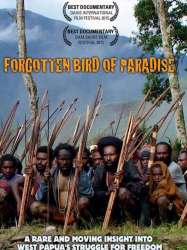
Forgotten Bird of Paradise (2009)
, 27minutesDirected by Dominic Brown
Origin United-kingdom
Genres Documentary
Themes Documentary films about law, Documentaire sur une personnalité
Rating78%






Unsettled (2007)
, 1h20Genres Documentary
Themes Films set in Africa, Films about religion, Documentary films about law, Documentary films about war, Documentary films about historical events, Documentaire sur une personnalité, Documentary films about politics, Documentary films about religion, Political films, Films about Jews and Judaism
Rating73%





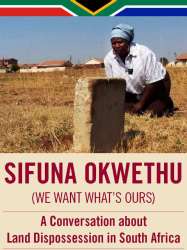
We Want What's Ours (2011)
Origin USA
Genres Documentary
Themes Films set in Africa, Films about racism, Documentary films about racism, Documentary films about law, Documentaire sur une personnalité, Documentary films about politics, Political films
The film tells the story of both sides claiming the same land as their own. The Ndolilas family’s land was taken by the apartheid government in the 1970s without compensation, and ever since then they have been on a quest to get it back. Standing in their way are working class black homeowners who purchased portions of the Ndolila's land during apartheid. For the homeowners, the land and houses they have legally purchased are a reward for their hard work and the fulfillment of their hopes and dreams for a better life in the new democracy. For the Ndolilas, the land is part of their family legacy and hence deeply intertwined with their identity. Both sides have a legitimate right to the land, and the film encourages viewers to think about whose rights should prevail.
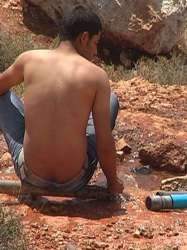
Interrupted Streams (2010)
, 1h15Origin Israel
Genres Documentary
Themes Films set in Africa, Environmental films, Films about religion, Documentary films about law, Documentary films about environmental issues, Documentary films about war, Documentary films about historical events, Documentaire sur une personnalité, Documentary films about politics, Documentary films about religion, Political films, Films about Jews and Judaism
Paths of lives are crossed in one village in the West Bank. Along the broken water pipelines, villagers walk on their courses towards an indefinite future. Israel that controls the water, supplies only a small amount of water, and when the water streams are not certain nothing can evolve. The control over the water pressure not only dominates every aspect of life but also dominates the spirit. Bil-in, without spring water, is one of the first villages of the West Bank where a modern water infrastructure was set up. Many villagers took it as a sign of progress, others as a source of bitterness. The pipe-water was used to influence the people so they would co-operate with Israel’s intelligence. The rip tore down the village. Returning to the ancient technique of collecting rainwater-using pits could be the villagers’ way to express independence but the relations between people will doubtfully be healed.
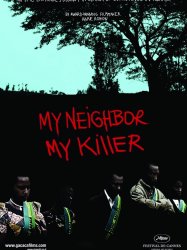
My Neighbor, My Killer (2009)
, 1h20Directed by Anne Aghion
Origin France
Genres Documentary
Themes Films set in Africa, Films about racism, Documentary films about racism, Documentary films about law, Documentary films about war, Documentary films about historical events, Documentaire sur une personnalité, Documentary films about politics, Political films
Rating75%





 , 1h
, 1hDirected by Andrew Goldberg
Origin USA
Genres Documentary
Themes Films set in Africa, Films about racism, Films about religion, Documentary films about racism, Documentary films about law, Documentary films about war, Documentary films about historical events, Documentaire sur une personnalité, Documentary films about politics, Documentary films about religion, Political films, Films about Jews and Judaism
Rating67%






Genres Documentary
Themes Films set in Africa, Films about music and musicians, Films about racism, Documentary films about racism, Documentary films about law, Documentary films about music and musicians, Documentaire sur une personnalité, Documentary films about politics, Musical films, Political films
Actors Walter Cronkite, Hugh Masekela, Miriam Makeba
Rating73%





In the film, South African musicians, playwrights, poets and activists recall the struggle against apartheid from the 1940s to the 1990s that stripped black citizens of South Africa of basic human rights, and the important role that music played in that struggle. The documentary uses a mixture of interviews, musical performances and historical film footage. Among the South Africans who take part are Miriam Makeba, Abdullah Ibrahim, Hugh Masekela, Vusi Mahlasela and others.
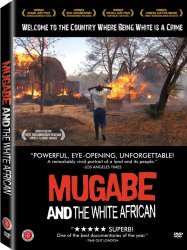
Mugabe and the White African (2009)
, 1h30Origin United-kingdom
Genres Documentary
Themes Films set in Africa, Environmental films, Films about racism, Documentary films about business, Documentary films about racism, Documentary films about law, Documentary films about environmental issues, Documentaire sur une personnalité, Documentary films about politics, Political films
Rating76%





En 2008, Mike Campbell – l’un des derniers fermiers blancs au Zimbabwe face au violent programme de réforme agraire – prend le risque sans précédent d’attaquer le Président Robert Mugabe devant le tribunal du SADC (Communauté de Développement Sud-Africain) afin de défendre ses droits. Son exploitation agricole emploie plus de 500 travailleurs et abrite également leurs familles. Mike Campbell accuse Mugabe et son gouvernement de discrimination raciale et de violation des Droits de l’Homme. Embarqués dans un procès hors du commun, Mike et sa famille vont devoir faire face à la violence et à la cruauté du régime du dictateur. Ce documentaire retrace leur combat.
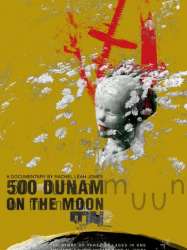
500 Dunam on the Moon (2002)
Origin USA
Genres Documentary
Themes Films set in Africa, Films about religion, Documentary films about law, Documentary films about war, Documentary films about historical events, Documentaire sur une personnalité, Documentary films about politics, Documentary films about religion, Political films, Films about Jews and Judaism

Origin USA
Genres Documentary
Themes Films set in Africa, Films about racism, Documentary films about racism, Documentary films about law, Documentaire sur une personnalité, Documentary films about politics, Political films
In the 1950s South Africans realized that their freedom struggle had to be built in four arenas of action: mass action, underground organization, armed struggle, and international mobilization. Have You Heard From Johannesburg takes viewers inside that last arena, the movement to mobilize worldwide citizen action to isolate the apartheid regime. Inspired by the courage and suffering of South Africa’s people as they fought back against the violence and oppression of racism, foreign solidarity groups, in cooperation with exiled South Africans, took up the anti-apartheid cause. Working against heavy odds, in a climate of apathy or even support for the governments of Hendrik Verwoerd, John Vorster and P.W. Botha, campaigners challenged their governments and powerful corporations in the West to face up to the immorality of their collaboration with apartheid.
 Connection
Connection